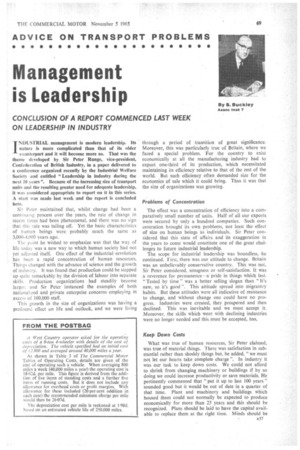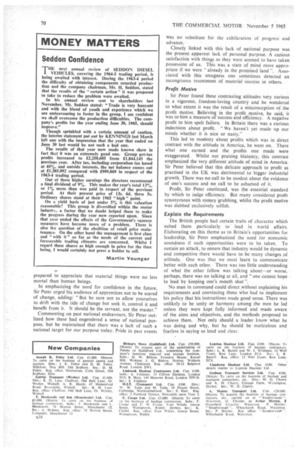Management is Leadership
Page 71

Page 72

If you've noticed an error in this article please click here to report it so we can fix it.
CONCLUSION OF A REPORT COMMENCED LAST WEEK ON LEADERSHIP IN INDUSTRY
INDUSTRIAL ,management is modern leadership. Its nature is more complicated than that of its older counterpart and it will become more so. That was the theme developed by Sir Peter Runge, vice-president, Confederation of British Industry, in a paper delivered to a conference organized recently by the Industrial Welfare Society and entitled "Leadership in industry during the next 20 years ". Because of the increasing size of transport units and the resulting greater need for adequate leadership, it was considered appropriate to report on it in this series. A start was made last week and the report is concluded here.
Sir Peter maintained that, whilst change had been a continuing process over the years, the rate of change in recent times had been phenomenal, and there was no sign that this rate was tailing off. Yet the basic characteristics of human beings were probably much the same as 3,000-4.000 years ago.
The point he wished to emphasize was that the way of life today was a new way to which human society had not yet adiu,ted itself. One effect of the industrial revolution has been a rapid concentration of human resources. Things changed with the advance of science and the growth of industry. It was found that production could be stepped up quite remarkably by the division of labour into separate skills. Production organizations had steadily become larger. and Sir Peter instanced the examples of both nationalized and private enterprise concerns employing in excess of 100,000 staff.
This growth in the size of organizations was having a profound effect on life and outlook, and we were living through a period of transition of great significance. Moreover, this was particularly true of Britain, where we faced a special problem. For the country to exist economically at all the manufacturing industry had to export one-third of its production, which necessitated maintaining its efficiency relative to that of the rest of the world. But such efficiency often demanded size for the economics of sale which it could bring. Thus it was that the size of organizations was growing.
Problems of Concentration
The effect was a concentration of efficiency into a comparatively small number of units. Half of all our exports were secured by only a hundred companies. Such concentration brought its own problems, not least the effect of size on human beings as individuals. Sir Peter considered that this state of affairs and its exaggeration in the years to come would constitute one of the great challenges to future industrial leadership.
The scope for industrial leadership was boundless, -he continued. First, there was our attitude to change. Britain was an unbelievably conservative country. This was not, Sir Peter considered, smugness or self-satisfaction. It was a reverence for permanence—a pride in things which last. "Tested by time" was a better selling slogan than "it's new, so it's good". This attitude spread into migratory habits. But these attitudes were all indicative of resistance to change, and without change one could have no progress. Industries were created, they prospered and then declined. This was inevitable and we must accept it. Moreover, the skills which went with declining industries were no longer needed and this must be accepted, too.
Keep Down Costs
What was true of human resources, Sir Peter claimed, was true of material things. There was satisfaction in substantial rather than shoddy things but, he added, "we must not let our hearts take complete charge ". In industry it was our task to keep down costs. We could not afford to shrink from changing machinery or buildings if by so doing we could increase productivity or save materials. He pertinently commented that "put it up to last 100 years" sounded good but it would be out of date in a quarter of that time. Plant and machinery and buildings which housed them could not normally be expected to produce economically for more than 25 years and this should be recognized. Plans should be laid to have the capital available to replace them at the right time. Minds should be
prepared to appreciate that material things were no less mortal than human beings.
In emphasizing the need for confidence in the future, Sir Peter urged his audience of apprentices not to be scared of change. adding:" "But be sure not to allow yourselves to drift with the tide of change but seek it, control it and benefit from it. It should be the servant, not the master."
Commenting on past national endeavours, Sir Peter outlined how these had engendered a sense of national purpose, but he maintained that there was a lack of such a national target for our purpose today. Pride in past events was no substitute for the exhilaration of progress and advance.
Closely linked with this lack of national purpose was the present apparent lack of personal purpose. A curious satisfaction with things as they were seemed to have taken possession of us. This was a state of mind more appropriate if we were "already in the promised land ". Associated with this smugness one sometimes detected an incongruous resentment of material success in others.
Profit Motive
Sir Peter found these contrasting attitudes very curious in a vigorous, freedom-loving country and he wondered to what extent it was the result of a misconception of the profit motive. Believing in the profit motive, he said, it was to him a measure of success and efficiency. A negative profit to him spelt failure. In Britain there was a curious indecision about profit. "We haven't yet made up our minds whether it is nice or nasty."
This led to modesty about profits which was in direct contrast with the attitude in America, he went on. There what one earned and the profits one made were exaggerated. Whilst not praising blatancy, this contrast emphasized the very different attitude of mind in America. Sir Peter believed that this delicate approach to profit as practised in the UK was detrimental to bigger industrial growth. There was no call to be modest about the evidence of one's success and no call to be ashamed of it.
Profit, Sir Peter continued, was the essential standard by which to judge efficiency. But many considered profit synonymous with money grubbing, whilst the profit motive was dubbed exclusively selfish.
Explain the Requirements
The British people had certain traits of character which suited them particularly to lead in world affairs. Elaborating on this theme as to Britain's opportunities for leadership, Sir Peter emphasized the need for economic soundness if such opportunities were to be taken. To sustain an attack, to ensure that industry would be dynamic and competitive there would have to be many changes of attitude. One was that we must learn to communicate better with each other. There was too little understanding of what the other fellow was talking about—or worse, perhaps, there was no talking at all, and " one cannot hope to lead by keeping one's mouth shut ".•
No man in command could direct without explaining his requirements and convincing those who had to implement his policy that his instructions made good sense. There was unlikely -to be unity or harmony among the men he led unless they were kept fully informed and made aware of the aims and objectives, and the methods proposed to achieve them. Not only should a leader know what he was doing and why, but he should be meticulous and fearless in saying so loud and clear.




















































































































